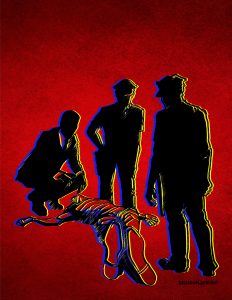By Michael “Buzz” Buzzelli, ‘Burgh Vivant
In a small southern town in 1962, racial tensions run high. When Pasadena police detective Virgil Tibbs (Kevin H. Moore) passes through Argo, Mississippi, he is accused of murder in Matt Pelfrey’s adaptation of John Ball’s novel, “In the Heat of the Night.”
When wealthy entrepreneur Charles Tatum (Brett Sullivan Santry) is clubbed over the head and left for dead on the side of the road, a grumpy Chief Gillespie (Daniel Pivovar) orders his men to check the railway station for anyone who may be stupid enough to flee. Officer Sam Wood (Jonathan Visser) arrives at the station. He – – incorrectly – – believes a black passenger, Tibbs, is the murderer simply because of the color of his skin.
At the station, Tibbs informs Gillespie, that he is a police detective in Pasadena. A miscommunication between the Pasadena and Argo police stations causes Tibbs to work the case much to the consternation of the bigoted police chief, his officers and Mayor Frank Schubert (Arthur Peden).
Tibbs wades through a pile of suspects while navigating the ever-present deep injustice and racial segregation in Argo.
Note: No one buries the N word here. It’s on repeat – ad infinitum. It’s said with all the venom and hatred the actors can muster. Bring your blood pressure medication, because it will spike at each egregious slur.

While there are a lot of scene changes, director Monteze Freeland keeps the action moving at a frenetic pace. There are several fight scenes, keenly choreographed by Randy Kovitz.
“Heat” is flawlessly cast.
Pivovar does a fine job as Chief Gillespie.
Adam Seligson plays seven different characters. He is very versatile. His portrayal of Ralph was the most interesting of the set.
Peden also plays two very distinct characters, Endicott and the mayor, with aplomb.
Visser’s Wood is the most complex character in the play. The police officer’s opinions vacillate when he tries to reconcile his prejudice with his sense of justice and morality. Visser plays the character with nuance.
Sullivan Santry is an accomplished actor but he is underutilized here. He is appropriately terrifying as a Klansman and as Noreen Purdy’s father.
Jenny Malarkey – cast in the roles of Melanie Tatum and Noreen Purdy – seems to be having the most fun on the stage. Melanie and Noreen are vastly different people and Malarkey is able to switch back and forth effortlessly. Also, Malarkey’s Noreen supplies the very few moments of comic relief in the entire evening.
The weight of the show falls on the actor who portrays Tibbs. Luckily, Moore is mesmerizing in the role. He is intense, stalwart and steadfast. The character is almost without flaw. When Tibbs reminisces about the-girl-who-got-away, we see a tiny dent in his heroic armor, which makes us even more sympathetic to our protagonist. Moore plays the moment wistfully without being melodramatic. It’s an excellent performance.
“Heat” is wonderful production, and, sadly, still relevant as fascism, racism, and homophobia are on the rise. Warning: It is hard to watch without wincing. “In the Heat of the Night” is aggravating for anyone with an ounce of empathy, but it is an extremely well-written, well-acted, well-directed. It’s an important piece of theater.
– MB
“In the Heat of the Night” run until March 11 at the Pittsburgh Playwrights Theatre Company, 937 Liberty Avenue, Pittsburgh, PA 15222. For more information, click here.


